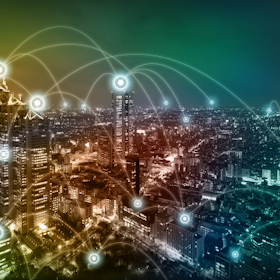Google Glasses, or Project Glass, has been receiving a fair amount of press after its recent announcement. The basic premise behind Project Glass is an augmented reality HUD (heads-up display) that the user wears over or just about the eye or eyes. This is intended to provide the user with a constant HUD for their life providing anything from points of interest regarding your surroundings to notifications regarding anything that happens across all of your social networks or various communication tools.
The video really says it all, so we won’t go in to too much detail. What we found surprising is that for the first time in quite a while we found ourselves wondering if this was taking personal technological integration too far.
If you were to compare me to my parents or almost anyone I’ve met from Generation X or above there would obviously be a lot of noticeable differences. For one I’m very comfortable with the idea of being plugged in and having my online life follow me wherever I go. I tend to pick up new technologies pretty easily and a lot of my down-time revolves around new-media and gaming.
What you’ll also notice is that I’m terrible at directions, have a tendency to Google things rather than try to remember them and I get stressed and a bit cranky whenever I know that I’ve been disconnected from the giant overseeing grid in the sky that syncs my entire life and helps tell me what to do, where to do it and when. My life is in my phone, my various computers and whatever software those gadgets contain. I acknowledge these failings in myself and see similar flaws in members of my generation who share my dependency on technology, even if they themselves aren’t aware of how much they use their tech in everyday life.
These shortcomings don’t often cause too many problems and I feel that I’ve gained more than I’ve lost by being technologically literate in an increasingly technological society. However, at what point should I stop falling back on technology and start using my brain again?
The video uploaded by Google that demonstrates the Project Glass concept (yes, it’s just a hypothetical concept right now) shows a man who doesn’t seem to remember that he has an upcoming date that night and has to be reminded by his HUD. When he does encounter something that he needs to remember he instantly logs it away in the HUD and moves on without a second thought. At a few stages throughout the video it almost seems as if this is a person who has given up on using their memory all together in favor of the cloud.
When he’s forced to walk only a few blocks in what is basically a straight line he’s instantly presented with a map and directions that update every step of the way. He isn’t required to be aware of his surroundings, nor does he need to remember the route that he took. This is part of the reason that I personally have a terrible sense of direction: I know that I as long as I have a phone and reception that I can make it anywhere without really having to pay attention. As a result I don’t need to commit landmarks and street names to memory because my phone already knows it all.
There are obviously some pretty cool things demonstrated in the video, but an overall impression can be given that this is an incredibly insular man who only pays attention to what’s in front of him right now. Anything that came before is remembered by the cloud and anything that’s coming after will be presented as a notification beforehand.
I have to admit that the idea of a world full of people engrossed in their own HUDs and muttering to themselves presents a slightly amusing picture. Even so, I'm still considering the question: how much technological integration is too much and at what point should we take a step back and start thinking about the implications of trading in our need to think and remember in favour of an easier solution?
It's a difficult question to answer and you'll probably find a different answer from almost everyone you ask. I'm still on the fence regarding the depth of integration that Project Glass proposes. On one hand I love how easy technology has made our lives, but on the other I'm concerned over pushing through in to an area where we lose any responsibility of memory and start relying on technology as our sole port of call for even the simplest of tasks.
Related Articles
Find Better Phones and Plans
Hundreds of cell phone plans unpacked. All the facts. No surprises.
































